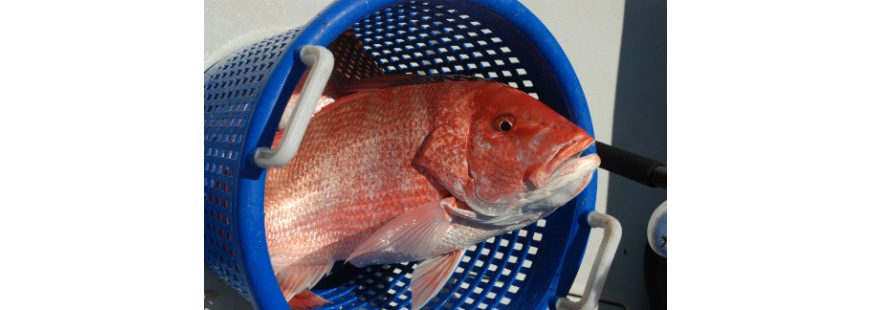Red snapper photo courtesy of Charles Witek
The state of Louisiana is embracing innovation and technology as a way to improve red snapper management. On Thursday May 25, Louisiana Department of Fish and Wildlife (LDFW) released a press statement detailing a pilot program for red snapper management in the recreational sector. This test program, in the form of an EFP (Exempted Fishing Permit), would use 25,000 pounds of red snapper quota to test a smart phone app. The quota is assigned to 150 randomly selected anglers who would be asked to hail in and hail out and report their catch via the app.
We can all agree that better data is needed in the recreational sector. Better data means more access, higher certainty of harvest rates, and better overall management of this public resource. As LDFW states in its fact sheet about the pilot program:
“Better data collection results in smaller margins of error; smaller margins of error results in smaller buffers applied to the ACL; smaller buffers in the ACL results in more fish available for harvest; more fish available results in more days for Louisiana anglers.”
Collecting accurate and timely fisheries data, however, has always been a difficult task. Currently, Louisiana is using a system called LA Creel. This system uses dockside interviews as well as approximately 700 phone interviews a week. LA Creel is providing good data. Unfortunately, this system is labor-intensive and has a moderate level of uncertainty in the data.
Governor John Bel Edwards and the Louisiana Department of Wildlife and Fisheries want to go a step further. They want to develop a system that provides the highest level of data. This could enable Louisiana to effectively aide in the management of red snapper out to 200 miles and give recreational fishermen the access they desire. The only way to accomplish this lofty goal is to test new systems in a controlled environment. The pilot program and corresponding app could provide a very real solution to some of the challenges with data collection.
Sadly, anything that involves red snapper has become an incredibly divisive issue. The contention comes from a lack of access to federal waters, distrust in federal management, and a perceived notion of giving a public resource to a few commercial fishermen.
Opposition to the proposal came from some national groups citing concerns that it would become an “IFQ” or “harvest tag program.” LDFW anticipated the opposition and addressed this argument in the fact sheet that the agency prepared for the announcement:
“This pilot project is NOT meant to eventually turn the red snapper recreational fishery into an Individual Fishing Quota (IFQ) system, a system that restricts harvest through the use of tags, or an annual catch share system. This test does not utilize tags. LDWF does not intend to ultimately restrict harvest of red snapper to a select few anglers. While this pilot project utilizes only 150 anglers, it is so that we can test electronic reporting using a sub-segment of the fishing public.”
Instead of supporting innovation, the groups that are supposed to speak for recreational anglers are turning the pilot program into a communications circus. As someone who has more than a decade of experience working with state fisheries offices, I will say that their response is a manifesto in how not to behave.
First and foremost, there’s an obvious lack of understanding about the pilot program and the goals it hopes to accomplish. As LDFW explains in its fact sheet:
“This pilot project is just one part of a larger, multi-faceted approach to the red snapper issue. One part of the approach is to obtain state-based management through the LA-Only Recreational Red Snapper amendment at the Gulf Council. However, the pilot project, if successful, could show that our data collection provides a harvest estimate with very little uncertainty (small margins of error).”
Second, it seems odd that any group would say that Louisiana is “gifting” select anglers with red snapper quota when LDWF is actually trying to help all recreational fishermen. One lesson I learned a long time ago was to not bite the hand that feeds you.
My message to recreational snapper fishermen is very simple. Embrace this pilot program. It could be one of the most efficient and best ways for you to get what you want. Understand that recreational anglers are represented well at LDFW. The folks there are scientists and are charged with the incredible task of managing wildlife and fish for the benefit of all. They don’t pick sides. They love the outdoors just like you and I do. (Put yourself in their shoes for a moment. You’d probably be beating your head on your desk right now.) They should be applauded for coming up with potential solutions to an issue that has become nothing short of a train wreck.
The ultimate goal for everyone is to increase access, provide better data, and properly manage the public resource. Don’t be part of the problem; instead support solutions. Ignore the rhetoric and, if you truly care about fisheries, wade through the nonsense and look for fact-based information. Make up your own mind; don’t let anyone else speak for you.


